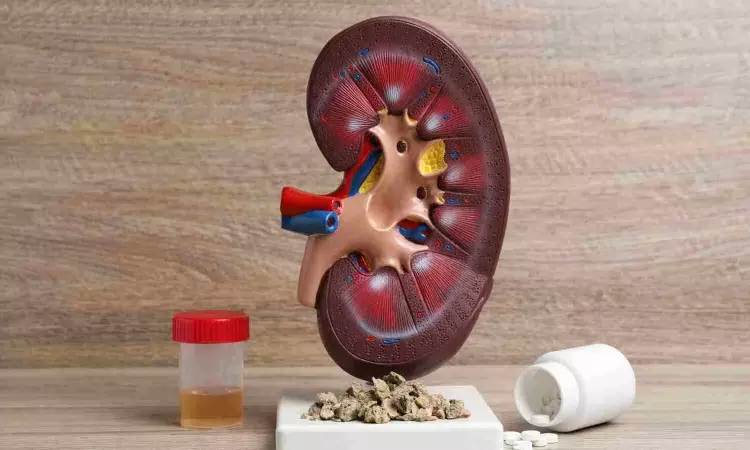- Home
- Medical news & Guidelines
- Anesthesiology
- Cardiology and CTVS
- Critical Care
- Dentistry
- Dermatology
- Diabetes and Endocrinology
- ENT
- Gastroenterology
- Medicine
- Nephrology
- Neurology
- Obstretics-Gynaecology
- Oncology
- Ophthalmology
- Orthopaedics
- Pediatrics-Neonatology
- Psychiatry
- Pulmonology
- Radiology
- Surgery
- Urology
- Laboratory Medicine
- Diet
- Nursing
- Paramedical
- Physiotherapy
- Health news
- Fact Check
- Bone Health Fact Check
- Brain Health Fact Check
- Cancer Related Fact Check
- Child Care Fact Check
- Dental and oral health fact check
- Diabetes and metabolic health fact check
- Diet and Nutrition Fact Check
- Eye and ENT Care Fact Check
- Fitness fact check
- Gut health fact check
- Heart health fact check
- Kidney health fact check
- Medical education fact check
- Men's health fact check
- Respiratory fact check
- Skin and hair care fact check
- Vaccine and Immunization fact check
- Women's health fact check
- AYUSH
- State News
- Andaman and Nicobar Islands
- Andhra Pradesh
- Arunachal Pradesh
- Assam
- Bihar
- Chandigarh
- Chattisgarh
- Dadra and Nagar Haveli
- Daman and Diu
- Delhi
- Goa
- Gujarat
- Haryana
- Himachal Pradesh
- Jammu & Kashmir
- Jharkhand
- Karnataka
- Kerala
- Ladakh
- Lakshadweep
- Madhya Pradesh
- Maharashtra
- Manipur
- Meghalaya
- Mizoram
- Nagaland
- Odisha
- Puducherry
- Punjab
- Rajasthan
- Sikkim
- Tamil Nadu
- Telangana
- Tripura
- Uttar Pradesh
- Uttrakhand
- West Bengal
- Medical Education
- Industry
SGLT2 Inhibitors versus DPP4 Inhibitors: Lower Nephrolithiasis Risk Found in Diabetes Patients, Study Finds

Korea: A recent study published in Diabetes Care has explored the risk of nephrolithiasis (kidney stones) associated with two popular classes of medications used to treat type 2 diabetes: Sodium-glucose co-transporter 2 (SGLT2) inhibitors and dipeptidyl peptidase-4 (DPP4) inhibitors.
The study revealed a lower risk of nephrolithiasis with SGLT2 inhibitors than DPP4 inhibitors in both stone never-formers and ever-formers. The researchers, however, noted that the relative risk reduction was more pronounced in those without a history of kidney stones, and the absolute risk reduction was more significant in patients with a prior history of stone formation.
SGLT2 inhibitors and DPP4 inhibitors are commonly prescribed for managing type 2 diabetes, a condition that often leads to complications such as kidney disease. Both classes of drugs have demonstrated benefits in reducing blood sugar levels and improving cardiovascular outcomes. However, concerns regarding potential side effects, including the risk of kidney stones, have prompted further investigation into their safety profiles. In light of this, Eun Ha Kang, Seoul National University College of Medicine, Seongnam, Korea, and colleagues aimed to compare the risk of nephrolithiasis in type 2 diabetes patients who started treatment with SGLT2 inhibitors versus DPP4 inhibitors, separately analyzing those with no prior history of kidney stones (stone never-formers) and those with a history of kidney stones (stone ever-formers).
For this purpose, the researchers conducted a population-based cohort study using the 2010–2021 Korea National Health Insurance Service database to compare initiators of SGLT2is versus DPP4is. The study's primary outcome was the incidence of nephrolithiasis, while osteoarthritis encounters were used as a negative control outcome. After performing 1:1 propensity score (PS) matching for stone never- and ever-formers, the researchers reported pooled and individual hazard ratios (HRs), incidence rate differences (IRD), and 95% confidence intervals (CIs). Subgroup analyses were also conducted, considering sex, age, thiazide co-use, and baseline cardiovascular risk.
The study revealed the following findings:
- A total of 17,006 propensity score-matched pairs of SGLT2i and DPP4i initiators were pooled from stone never-formers (105,378 pairs) and ever-formers (11,628 pairs).
- Over a mean follow-up of 654 days, the risk of nephrolithiasis was lower in SGLT2i initiators than DPP4i initiators, with rates of 0.65 vs. 1.12 events per 100 person-years, respectively.
- The hazard ratio (HR) for nephrolithiasis risk was 0.54, and the incidence rate difference (IRD) was −0.46.
- In stone never-formers, the HR was 0.43, and the IRD was −0.32.
- In stone ever-formers, the HR was 0.64, and the IRD was −2.26.
- No significant associations were observed for osteoarthritis encounters.
- The results were consistent across subgroups.
"We found that initiating SGLT2 inhibitors, compared to DPP4 inhibitors, was associated with a reduced risk of nephrolithiasis and related interventions in both stone never- and ever-formers with type 2 diabetes," the researchers wrote.
"While the relative risk reduction was greater in stone never-formers, the absolute incidence rate reduction was more significant in ever-formers. The reduced risk of stone development was consistent across subgroups stratified by sex, age, thiazide use, and baseline cardiovascular risk."
Reference:
Anna Shin, Ju-Young Shin, Eun Ha Kang; Risk of Nephrolithiasis Associated With SGLT2 Inhibitors Versus DPP4 Inhibitors Among Patients With Type 2 Diabetes: A Target Trial Emulation Study. Diabetes Care 22 January 2025; 48 (2): 193–201. https://doi.org/10.2337/dc24-1652
Dr Kamal Kant Kohli-MBBS, DTCD- a chest specialist with more than 30 years of practice and a flair for writing clinical articles, Dr Kamal Kant Kohli joined Medical Dialogues as a Chief Editor of Medical News. Besides writing articles, as an editor, he proofreads and verifies all the medical content published on Medical Dialogues including those coming from journals, studies,medical conferences,guidelines etc. Email: drkohli@medicaldialogues.in. Contact no. 011-43720751


